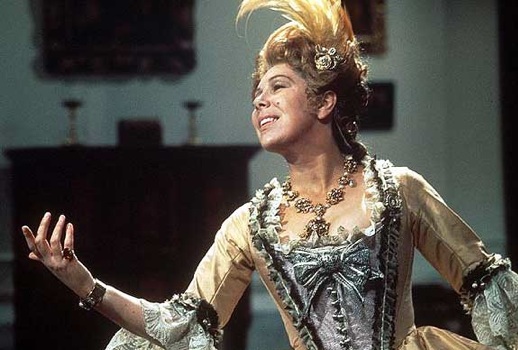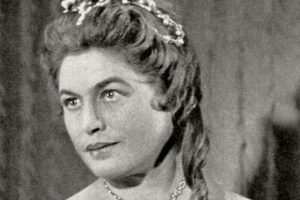

But I happily discovered that I could now record broadcasts without a microphone: my new-used machine had an odd-looking 7-prong jack that matched one on the back of my father’s fancy NordMende shortwave radio. So I hooked them together with a pricey new cord and—voilà—no more embarrassing hissy-fits when my mother barged into my room while I was recording!
But finally, after weeks of waiting, brown padded envelopes arrived, their contents more often than not contained revelations! At first I bathed in the fireworks of Rossini’s La Donna del Lago with Montserrat Caballè, Franco Bonisolli and Pietro Bottazzo (who quickly became a favorite); basked in the luxurious sensuality of Tatiana Troyanos and Eric Tappy as Monteverdi’s amoral lovers Poppea and Nerone; and puzzled over my love-hate for Gundula Janowitz’s melting, yet steely soprano as Haydn’s Armida loved and raged.
Soon the most obscure works were gliding through my capstans: Keiser’s delightful Der Lächerliche Prinz Jodelet, Boismortier’s Don Quichote chez la duchesse, and Cimarosa’s Il Marito Disperato became favorites. And I explored composers I thought I knew well—Torvaldo e Dorliska (with more Bottazzo and the lovely Lella Cuberli) and La Pietra del Paragone shot up on the list of my most listened-to Rossini operas.
Act 1 finale from Torvaldo e Dorliska
RAI Milan 23 December 1975
Alberto Zedda, conductor
I endeavored not to neglect more well-known operas too—my first Eugene Onegin and Pique Dame came courtesy of pirates from the legendary 1975 visit to the Met by the Bolshoi Opera. But, for some reason, I never ordered Il Pirata!
When a shipment arrived, the tapes were accompanied only by a sheet of paper or index card with the title, composer, performance venue and date and cast list typed out or hand-written on it. Very often I would be listening to an opera I’d never heard before with little or no idea of what was going on. Looking back, I’m struck at how odd that must have been, but I either responded to the music—or I didn’t.
I guess I was very lax then about getting to the library to look for a synopsis of Cherubini’s Ali Baba ou les Quarante Voleurs, for example. In many cases there might not have been one to find, but I ended up loving many of those mysterious operas just the same. I adored Tchaikovsky’s Iolanta for years before I found out it was about a blind princess!
Through pirates I also came to know the work of those pioneers who resurrected many early operas, some figures who have now been nearly forgotten. One who helmed many fascinating discoveries was the American musicologist and conductor Newell Jenkins. He was a tireless advocate of Agostino Steffani who was decades later “rediscovered” again by Cecilia Bartoli and whose opera Tassilone was particularly pleasing.
The sometimes ragtag Clarion Concerts group was the first to put on Vivaldi operas like L’Incoronazione di Dario. Remarkably, Jenkins conducted Hasse’s L’Olimpiade in New York City back in 1971 and the tape was my first exposure to that irresistible composer, to a grandly impressive portrayal of the hero Megacle by the little-known American mezzo Joan Caplan and to mind-boggling ornaments in altissimo by Rita Shane. Has there been a professional performance of a Hasse opera in New York in the 44 years since?
Aria from L’Olimpiade
Rita Shane, soprano
Alice Tully Hall
16 March 1971
My ravenous thirst to hear all of Handel’s 40+ operas began to be sated as I ferreted out the more esoteric ones and also came to know and love the performers who made the British Handel renaissance of the 60s and 70s so important. The famous 1959 Rodelinda starred Joan Sutherland singing divinely (and in quite intelligible English) and was conducted by one of my new heroes, Charles Farncombe. Soon, Heather Harper as Deidamia and Paul Esswood as Riccardo Primo and Sosarme and the marvelous but little-known Patricia Kern in Ottone and Valerie Masterson in Scipione were my new best friends.
Experiencing the wonderful Janet Baker at her best proved the greatest epiphany resulting from all those treasured Handel in-house recordings and broadcasts. I’d long loved Baker from her many Angel LPs; she had also become my sister’s favorite target when she wanted to make fun of my “individual” listening habits. Though Baker is indisputably the greatest Handel singer since the composer’s time, she recorded surprisingly little of his music despite her otherwise large discography.
After the Sutherland Rodelinda in which Baker sings Eduige, I had to have her Orlando, her Andronico (Tamerlano), her Tirinto (Imeneo), her Radamisto–and her glorious Alceste in Admeto where she valiantly competes for the hero’s love against the shining Antigona of Sheila Armstrong—a true modern-day Cuzzoni versus Faustina.
Nearly all of these are invaluable BBC broadcasts, many conducted by the great Anthony Lewis, but the one tape that I nearly wore out was a live 1979 Giulio Cesare from the English National Opera which features Baker—five years before the somewhat disappointing video—in fresh, fiercely commanding form.
Aria from Giulio Cesare
Janet Baker, mezzo-soprano
English National Opera
18 December 1979
Tapes also permitted me to glimpse more Jurinac, for example—her Poppea, Iphigénie, Tatyana and Jenufa. When I read about singers who interested me I could immediately order samples: intrigued by reviews of Gabriela Benacková, I soon was listening in wonder to her US debut as Kát’a Kabanová and to Dvorák’s ravishing but rarely done Svatební Kosile (The Spectre’s Bride),
But Benacková didn’t prove to be my first Rusalka—that was a surprisingly effective Hildegard Behrens, thanks to a 1981 Munich broadcast in German co-starring Kurt Moll’s mellifluous Vodnik. My love of Julia Varady even led me to acquire a very odd Rossini Le Comte Ory also in German where she flirted as Adèle opposite the sparky Isolier of Reri Grist!
Lensky’s aria from Eugene Onegin
Vladimir Atlantov, tenor
Bolshoi Opera at the Metropolitan Opera House
7 July 1975
Close encounters with a variety of pirates, including the legendary “Mr. Tape,” in Part 3.
























Comments